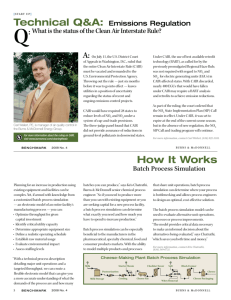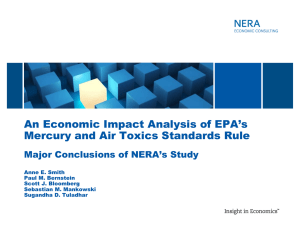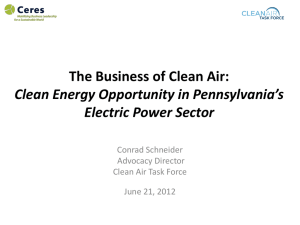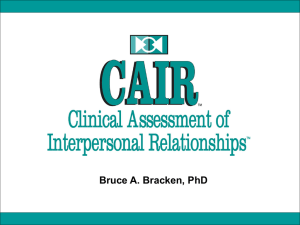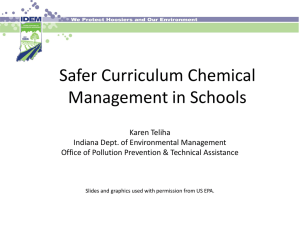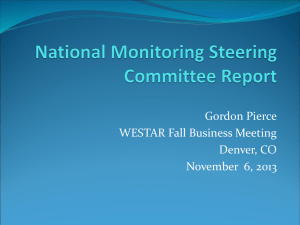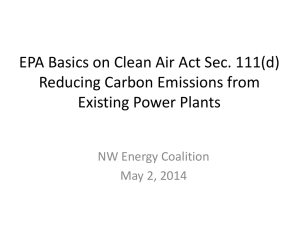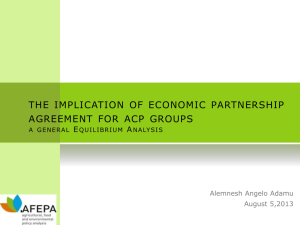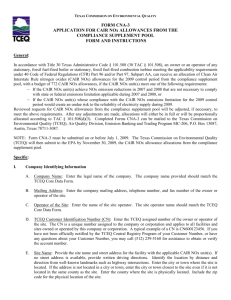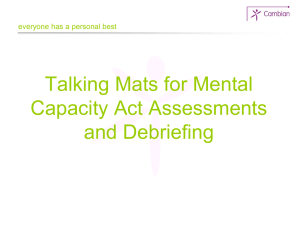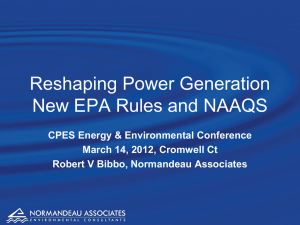Chris Goodman - AWMA Southern Regional CAIR MATS FINAL
advertisement
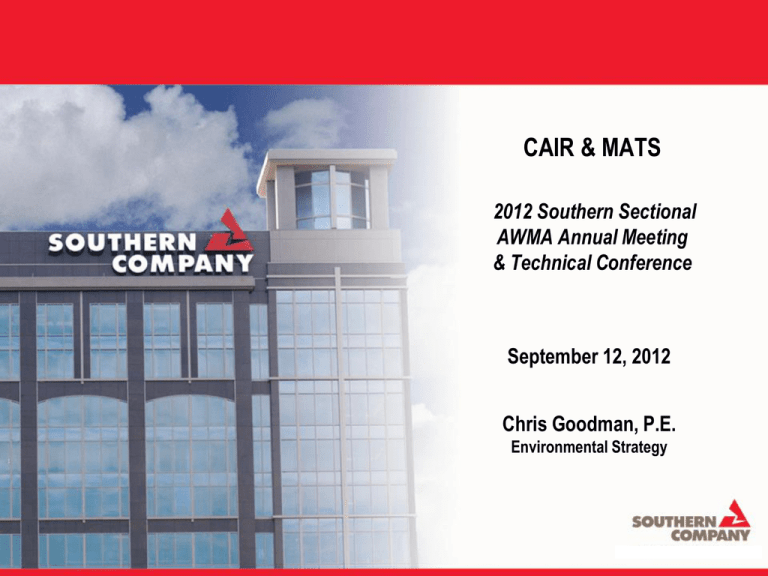
CAIR & MATS 2012 Southern Sectional AWMA Annual Meeting & Technical Conference September 12, 2012 Chris Goodman, P.E. Environmental Strategy Southern Company Generating Facilities Environmental Program at a Glance • Through 2011, invested about $8.3 B in environmental controls 17 FGDs on 25 units 17 SCRs 4 baghouses with ACI • Projected base capital environmental expenditures of about $1.5 B over the next 3 years; Projected to spend an estimated $1.8 B for MATS and $0.5 B for ash and water compliance over the next 3 years • Since 1990, emissions of sulfur dioxide and nitrogen oxides are down over 70 percent, while electricity generation has increased by more than 30 percent to serve growing demand Environmental Leadership New Projects and Research Programs Smart Grid: Integrated Distribution Management System Second Largest U.S. Solar Cimarron Solar Facility Water Research Center Georgia Power Plant Bowen U.S. first New Nuclear Georgia Power Plant Vogtle National Carbon Capture Center Wilsonville, Alabama Integrated Gasification Combined Cycle Mississippi Power Plant Ratcliffe Largest U.S. Biomass Nacogdoches Generating Facility Air Quality Science Center SEARCH network; ARIES; mercury Power Delivery and End-Use Technology Lab Mercury Research Center Gulf Power Plant Crist Start-to-finish 25-MW CCS Alabama Power Plant Barry Transport Rules (CAIR/CSAPR) • CSAPR vacated and remanded to EPA August 21 (CAIR remains in place) – Court held that EPA exceeded its CAA authority • CAIR Phase II begins in 2015 – Tighter SO2 and NOx allowance requirements Mercury and Air Toxics Standards (MATS) • Final rule issued by EPA on February 16, 2012 – Largely unchanged from proposed rule – Some additional compliance flexibilities based on comments • Imposes stringent emission limits for mercury, particulate matter, and acid gases • Could force many retirements and large capital expenditures across the industry • Unreasonable compliance time of three years(April 2015), with case-by-case 1-year extensions EPA New Regulatory Actions Timeline Action MATS Criteria Pollutants (NO2, SO2, Ozone, PM) Coal Combustion Residuals Water 316 (b) Effluent Guidelines Greenhouse Gases (GHGs) (Reporting Rule, Permitting, Performance Standards) 2011 Proposed Rule Comment Period 2012 Final Rule New or Revised Standards 2013 2014 2015 2016 MATS Rule Pre-compliance Period for existing sources NAAQS SIP Compliance CAIR Phase II (until new CAIR RR) CAIR Phase I (until new CAIR Replacement Rule) Possible Compliance w/CAIR RR Proposed and Final CAIR RR EPA Developing Final 316(b) Rule CCR Rule Pre-compliance Period Final Rule Final Rule CCR Rule Compliance 316 (b) Rule Compliance 316 (b) Rule Pre-compliance Period Developing New Effluent Guidelines Rule Final Rule (within 8 years of Final Rule) Effluent Guidelines Pre-compliance Period Effluent Guidelines Compliance EPA GHG Reporting Rule Compliance Best Available Control Technology for Modified/New Sources (PSD/NSR/BACT) GHG Performance Standards Inc. Existing Units Final Rule 2018 MATS Rule Compliance for existing sources Nonattainment Areas Designated and State SIPs Developed EPA Developing Final Rule 2017 Pre-compliance Smaller Sources Included by EPA Compliance with New GHG Rules Emission Control Technologies for Coal-Fired Boilers •CAIR/CSAPR •PM-2.5 NAAQS •8-Hour Ozone NAAQS •Mercury (Cobenefit) •Regional Haze (BART) •NO2 NAAQS • Utility MACT Coal-Fired Boiler NOx & Hg Control SCR SNCR NOX Combustion Controls Air Heater Dust&Hg Control ESP SO2 & Hg (acid gases) Control Scrubber CO2 Reduction Flyash Gypsum Bottom Ash •316(a) Thermal •316(b) Intake Structures Groundwater Monitoring/ Dry Handling / Landfilling / Pond Closure • CCR Rule •Effluent Guidelines •CAIR/CSAPR •Regional Haze (BART) •Mercury (Cobenefit) •PM-2.5 NAAQS •SO2 NAAQS •Effluent Guidelines Process Water Cooling Tower/ Intake Screens •GHG Regulation/Legislation Scrubber WasteWater Physical/Chemical/ Biological Treatment Scrubber WasteWater Ultra Fine Filtration New Stack Balance NOx SCRs CC/CT Customers Baghouses Nuclear PM Wind IGCC High Reliability Low Prices High Customer Satisfaction New Resources Water CCR Hydro Solar Renewables Ash H20 Nuclear Regulatory Drivers Natural Gas Healthy Capital Spending Constructive Regulation SOx Hg IGCC Scrubbers DSO CO2 CCS Biomass Demand Side Options Preliminary Assessment of Impacts of EPA Rules – More to Come Possible Outcome Potential Impacts • Install new controls on 13 GWs - 65% of coal fleet. • Estimated $13B - $ 18B capital cost through 2020 • Retire 3 – 4 GWs of coal-fired generation. • Fuel switching of 3 -4 GWs, primarily to natural gas • Possible 10% - 20% electricity price increases over the next 10 years Summary • Cumulative impacts of MATS, CSAPR/CAIR, 316(b), new effluent guidelines, CCBs, NAAQS, GHGs and other requirements must be considered when making decisions • Research, testing and planning are the keys to finding the least cost, least regret, site specific solution • Continuous process and is complicated by uncertain future environmental rules and national energy policies
